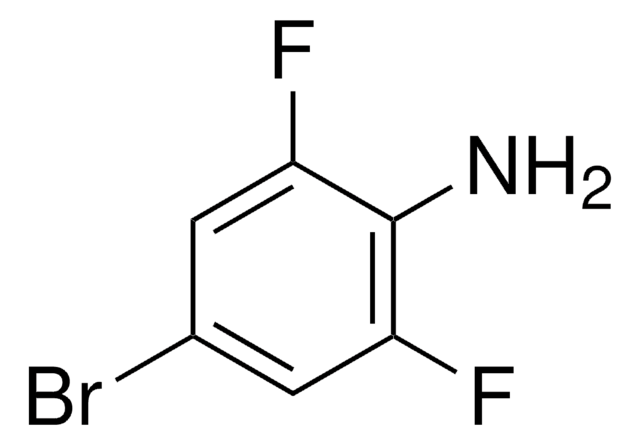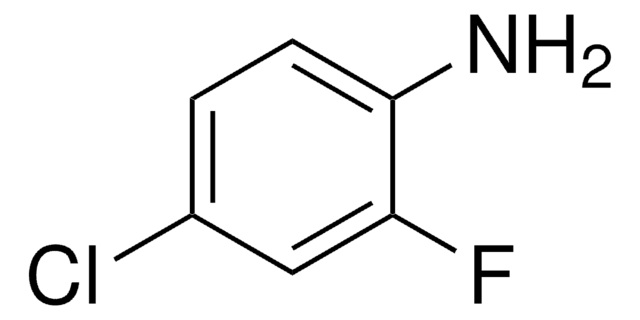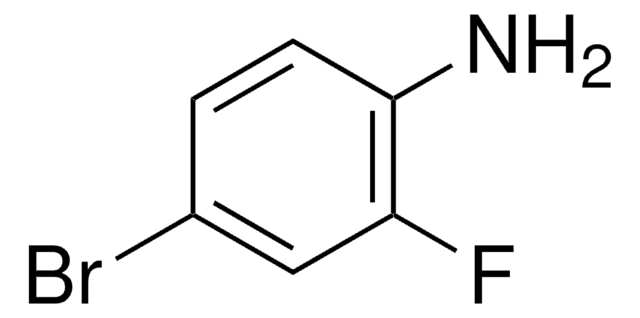All Photos(1)
About This Item
Linear Formula:
F2C6H3NH2
CAS Number:
Molecular Weight:
129.11
Beilstein:
2802556
EC Number:
MDL number:
UNSPSC Code:
12352100
PubChem Substance ID:
NACRES:
NA.22
Recommended Products
Quality Level
Assay
99%
form
liquid
refractive index
n20/D 1.506 (lit.)
bp
170 °C/753 mmHg (lit.)
mp
−7.5 °C (lit.)
density
1.268 g/mL at 25 °C (lit.)
SMILES string
Nc1ccc(F)cc1F
InChI
1S/C6H5F2N/c7-4-1-2-6(9)5(8)3-4/h1-3H,9H2
InChI key
CEPCPXLLFXPZGW-UHFFFAOYSA-N
Looking for similar products? Visit Product Comparison Guide
Signal Word
Danger
Hazard Statements
Precautionary Statements
Hazard Classifications
Acute Tox. 3 Dermal - Acute Tox. 4 Oral
Storage Class Code
6.1C - Combustible acute toxic Cat.3 / toxic compounds or compounds which causing chronic effects
WGK
WGK 1
Flash Point(F)
143.6 °F - closed cup
Flash Point(C)
62 °C - closed cup
Personal Protective Equipment
dust mask type N95 (US), Eyeshields, Gloves
Choose from one of the most recent versions:
Already Own This Product?
Find documentation for the products that you have recently purchased in the Document Library.
Customers Also Viewed
Wei Chih Huang et al.
Spectrochimica acta. Part A, Molecular and biomolecular spectroscopy, 93, 176-179 (2012-04-07)
We applied the two-color resonant two-photon ionization and mass-analyzed threshold ionization techniques to record the vibronic and cation spectra of 2,4-difluoroaniline. The cation spectra were recorded by ionizing via the 0(0), X(1), 6b(1), and 1(1) levels of the electronically excited
Sergey E Korchak et al.
The Journal of chemical physics, 137(9), 094503-094503 (2012-09-11)
Effects of spin-spin interactions on the nuclear magnetic relaxation dispersion (NMRD) of protons were studied in a situation where spin ½ hetero-nuclei are present in the molecule. As in earlier works [K. L. Ivanov, A. V. Yurkovskaya, and H.-M. Vieth
Duoli Guo et al.
AAPS PharmSciTech, 13(2), 661-673 (2012-05-04)
A stability-indicating high-performance liquid chromatography method to quantify 2-(2,4-difluorophenyl)-4,5,6,7-tetrafluoroisoindoline-1,3-dione (NSC-726796) and its three main degradation products was developed. This method was used to investigate its degradation kinetics and mechanism. The reaction follows first-order kinetics and appears to be base catalyzed
Gergely Rácz et al.
Pathology oncology research : POR, 18(3), 579-584 (2011-12-14)
Disinfection of raw water is essential to the production of drinking water. However, by-products of disinfection may exert toxic effects. The potential toxic effects of two of these compounds, 4-ethylbenzaldehyde (EBA) and 2,4-difluoroaniline (DFA) were investigated using the zebrafish (Danio
P J Boogaard et al.
Environmental health perspectives, 102 Suppl 6, 27-29 (1994-10-01)
Exposure to 2,4-difluoroaniline (DFA) was monitored by GC-MS of DFA adducts bound to hemoglobin (Hb). In two studies, involving 20 and 16 workers potentially exposed to low concentrations of DFA, median concentrations of 10 (range 1-83) and 20 (range 4-322)
Our team of scientists has experience in all areas of research including Life Science, Material Science, Chemical Synthesis, Chromatography, Analytical and many others.
Contact Technical Service










